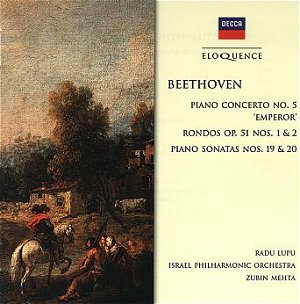This disc is one of four releases on the budget-priced Eloquence label
containing Radu Lupu’s 1970s recordings of all five Beethoven Piano
Concertos. Lupu’s performances were widely acclaimed when they first
appeared, and it is good to see them back in circulation. They were
taped variously between 1971 (No 3) and 1980 (No 1, the only digital
recording in the set) and, with the exception of No 3 (in which Lawrence
Foster conducts the London Symphony Orchestra), featured the Israel
Philharmonic Orchestra, conducted by Zubin Mehta. In fact Decca proudly
proclaim these (with their prominent photo-logo of Mehta) to be part
of their ‘Zubin Mehta Edition’, thereby attributing (by implication)
the lion’s share of the honours to the conductor rather than the soloist!
The complete series is gathered together as follows.
Nos 1 and 4 share one (well-filled) disc: 466 707-2. The rest are
coupled with a variety of other Beethoven orchestral or piano music.
No 2 includes (very generously) an almost complete Prometheus,
on 466 681-2. No 3 (fittingly, but far from generously) is followed
by the 32 Variations on an Original Theme, on 466 690-2. On the
disc we’re considering here, No 5 is topped up with a short (but agreeably
self-contained) recital comprising the two Op 51 Rondos, and the two
two-movement Sonatas of Op 49.
The two missing pieces from this list are the so-called
‘Triple Concerto’ (Op 56 in C major, for piano, violin, cello and
orchestra) and the ‘Choral Fantasy’ (Op 80 in C minor, for piano,
chorus and orchestra). So far as I am aware, Lupu has not recorded these,
but readers wishing to complete their collection may wish to note that
(very usefully) they can be found together on the (Philips) Eloquence
label – the number is 464 368-2. Arrau is the pianist in the former,
with Szeryng and Starker, and conducted by Inbal: the latter comes from
the complete Brendel-Haitink set.
This is undoubtedly an ‘Emperor’ to be reckoned with.
Lupu’s on good form, and Mehta contributes a stylish accompaniment.
So – a good buy? Not really! Read on…
In the other issues of this series, Piano Concertos
Nos 1-4, Lupu’s spontaneity and subtlety result in stylish and honest
performances which say a great deal about the composer and his spirit:
even the orchestral accompaniments – not ideally committed or polished
– wouldn’t prevent me from making a recommendation. And, if pressed,
I confess it’s much the same here. Except that Lupu seems less well
suited to the extrovert bravura of this Concerto: his playing could
be both freer (the opening flourishes, for example, which lose some
of their impact with his rather literal approach) and weightier. And
the Israel Philharmonic is not a Premier League team, I fear: there
are times when the ensemble and even their intonation leave something
to be desired. Listen to the mighty exchanges between soloist and orchestra
which lead into the piano’s notorious quadruple octaves in the first
movement: the dotted rhythms aren’t together, and the voicing of the
chords leave a nasty taste in the ear.
Does any of this really matter? Well yes, because good
budget price recordings of the ‘Emperor’ aren’t hard to find these days.
Take your pick from Kovacevich with Davis; Pollini with Boehm; Ashkenazy
with Solti; Lill with Gibson; or Michael Roll (who is quite excellent,
with a superb conductor in fellow pianist Howard Shelley). Best of all,
try Perahia, with Haitink conducting an inspired Concertgebouw, coupled
with No 4; or Kovacevich’s later recording in which he directs the very
expert Australian Chamber Orchestra from the keyboard, coupled (most
enterprisingly) with the Grosse Fuge.
In making these alternative recommendations, I’m assuming
that the coupling isn’t likely to be a major factor in buying this Lupu
issue. I’d be surprised if that were so, the Op 51 Rondos and Op 49
Sonatas (which Lupu plays superbly) being – if I may put it this way
– both early and easy. The Lupu-Mehta recording sounds fine, by the
way; but my top two (Perahia and the later Kovacevich) are state-of-the-art
digital.
No contest, then, despite being a thoroughly adequate
performance and recording.
Peter J Lawson
AVAILABILITY
www.buywell.com


